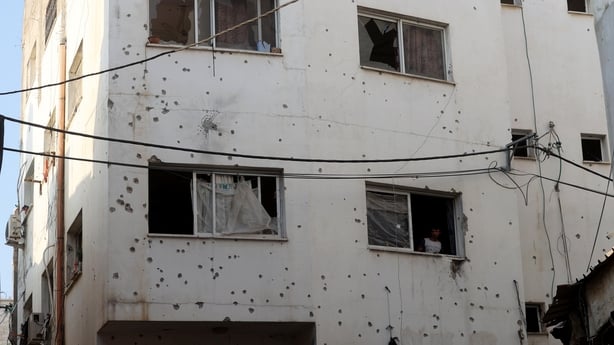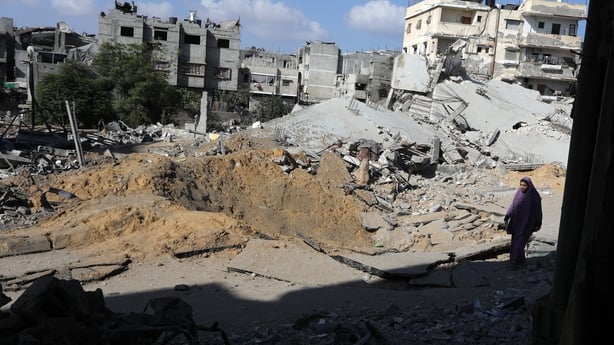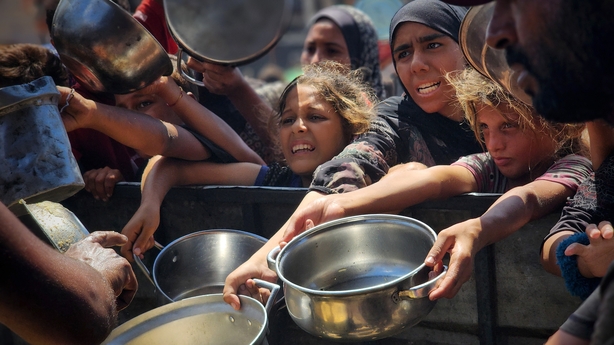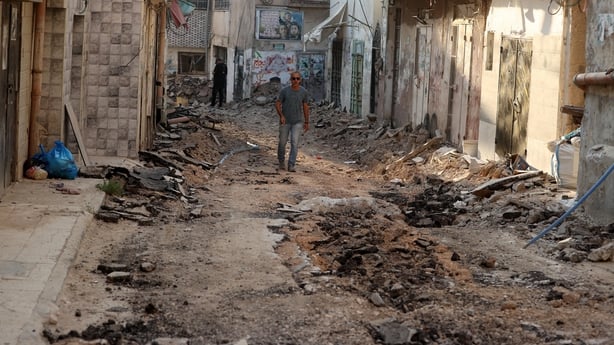A US citizen taking part in a protest against settlement expansion in the occupied West Bank has died after being shot in the head by Israeli troops, the official Palestinian news agency WAFA reported.
The Israeli military said it was looking into the report.
There was no immediate comment from the US embassy.
Fouad Nafaa, the head of the Rafidia Hospital in Nablus, said the woman, who was an activist in her mid-20s, arrived at the hospital in a very critical condition, with a serious head injury.
"We tried to perform a resuscitation operation on her, but unfortunately she died," he said.
WAFA said the incident occurred during a regular protest march by activists in Beita, a town near the city of Nablus that has seen repeated attacks by settlers.
Last month, a US citizen said he was shot by Israeli forces and wounded in the leg during a protest against settlement expansion in the occupied West Bank, as the Israeli military confirmed it fired live rounds to disperse the gathering.
Palestinian medics reported that a foreign activist was shot during the demonstration in the town of Beita, while the Israeli military said he was "accidentally injured".
Israeli troops or settlers have killed at least 661 Palestinians in the West Bank since Hamas's unprecedented attack on southern Israel on 7 October, according to the Palestinian health ministry.
At least 23 Israelis, including security forces, have been killed in Palestinian attacks in the territory during the same period, according to Israeli officials.
Israel reportedly winding down Jenin raid
The news of the death of the US citizen in Nablus comes as Israeli forces appeared to be winding down a ten-day raid in a flashpoint city in the occupied West Bank, as key ally Germany warned against treating the territory like Gaza.
There was no official confirmation from the Israeli military that it had withdrawn from Jenin, a bastion of Palestinian armed groups, but AFP journalists reported residents returning to the city following the fighting.
The reported withdrawal came as Israel is at loggerheads with its main ally the United States over talks aimed at forging a truce in the Gaza war, now nearly in its twelfth month.
Multiple rounds of diplomacy have so far failed to clinch a ceasefire deal to end the conflict and bring the release of Israeli and foreign hostages held in Gaza as well as many Palestinians jailed in Israel.
The two warring sides continued to blame one another for the fruitless efforts of mediators including Qatar, Egypt and the United States.
The US is preparing to present a new ceasefire proposal to hammer out differences, but prospects of a breakthrough remain dim as gaps between the sides remain wide.
US Secretary of State Antony Blinken urged both Israel and Hamas to finalise a truce deal yesterday, saying: "I think based on what I've seen, 90% is agreed."
But Israeli Prime Minister Benjamin Netanyahu denied this in an interview with Fox News, saying: "It's not close."

Washington, along with fellow mediators in the talks Qatar and Egypt, has been pushing a proposal to bridge gaps between both sides which trade blame for the failure to reach a deal.
Mr Netanyahu insists on an Israeli military presence on the border between Gaza and Egypt along the so-called Philadelphi Corridor.
Hamas is demanding a complete Israeli withdrawal, saying it agreed months ago to a truce agreement outlined by US President Joe Biden.
Israel has said it will not leave the Philadelphi corridor, but Hamas says a deal is not possible unless it does.
We need your consent to load this rte-player contentWe use rte-player to manage extra content that can set cookies on your device and collect data about your activity. Please review their details and accept them to load the content.Manage Preferences
In Israel, German Foreign Minister Annalena Baerbock said that "a purely military approach is no solution to the situation in Gaza", referring to the recovery of six more dead hostages announced on Sunday.
She also warned against calls by hardline right-wing members of Israel's cabinet for the military to take a similar approach to the West Bank as in Gaza.
"When members of the Israeli government themselves call for the same approach in the West Bank as in Gaza, that is precisely what acutely endangers Israel's security," Ms Baerbock told reporters.
Her Israeli counterpart Israel Katz said Iran wanted to "arm" the West Bank "just like" Gaza.
"Nobody wants a deal for the hostages' release and a ceasefire more than Israel," he added and blamed Hamas for the impasse in talks.

Of the 251 hostages seized by Hamas militants during the 7 October attack, 97 remain in Gaza including 33 the Israeli military says are dead.
Scores were released during a one-week truce in November.
Israel's retaliatory offensive in Gaza has so far killed at least 40,878 people, according to the health ministry in the Hamas-run territory.
Most of the dead are women and children, according to the UN rights office.
Meanwhile, residents of Khan Younis and displaced families from Rafah continued to crowd medical facilities, bringing their children to be vaccinated against polio.
The campaign was launched after the discovery of a case of a one-year-old baby who was partially paralyzed.
It re-emerged as Gaza's health system has virtually collapsed and many hospitals have been knocked out of action due to the war.
The United Nations agency for Palestinian refugees, UNRWA, said at least 160,000 children received the drops in southern areas of Gaza yesterday where medical staffers began the second stage of the campaign, benefiting from an Israeli and Hamas agreement on limited pauses in the fighting.
Today, Israeli military strikes killed at least 27 Palestinians across the Gaza Strip, medics said, as health officials resumed vaccination of tens of thousands more children in the enclave against polio.
In Nuseirat, one of the territory's eight historic refugee camps, an Israeli airstrike killed two women and two children, while eight other people were killed in two other airstrikes in Gaza City, the medics said.
The rest were killed in subsequent strikes across the enclave, they added.
Israeli forces battled Hamas-led militants in the Zeitoun suburb of Gaza City, where residents said tanks have been operating for over a week, in eastern neighbourhoods of Khan Younis, and in Rafah, near the border with Egypt, where residents said Israeli forces blew up several houses.
The vaccination campaign will shift on Sunday to the northern Gaza Strip, which has been the focus of the major Israeli military offensive in the past 11 months.
According to the World Health Organization, a second round of vaccinations would be required four weeks after the first round.

It comes as Mr Netanyahu is under increasing pressure both internationally and domestically, with Israelis enraged and grief-stricken after the bodies of the six hostages were retrieved from Gaza.
He said they were "executed" with a bullet "to the head".
At Israeli protests in several cities, the prime minister's critics have blamed him for hostages' deaths, saying he has refused to make necessary concessions for striking a ceasefire deal.
According to the United Nations, at least 1.9 million people- or nine in 10 -across the Gaza Strip are internally displaced, including people who have uprooted up to 10 times or more
In addition to the Gaza war, Israel also faces increased anger from Palestinians in the West Bank, a territory it occupied in 1967.

The military launched coordinated raids across the northern West Bank on 28 August with soldiers supported by armoured vehicles and bulldozers.
There was no immediate confirmation from the military of the end of what it said was "counter-terrorism activity in the area of Jenin".
Palestinian health ministry figures put the death toll for the Israeli incursion at 36.
Many homes in Jenin camp were damaged or destroyed by Israeli bulldozers which also churned up road surfaces.
Following the withdrawal, Jenin residents used bulldozers of their own to begin clearing the rubble.
A resident told AFP he returned to his family home of 20 years to find it had been raided by soldiers.
"Thank God (the children) left the day before. They went to stay with our neighbours here," said Aziz Taleb, a 48-year-old father of seven.
"If they had stayed, they would have been killed without warning or anything," he added.
During the Jenin operation, Israeli forces killed 14 militants, arrested 30 suspects, dismantled "approximately 30 explosives planted under roads" and conducted four aerial strikes, the Israeli military statement said.
A soldier was killed in Jenin, where most of the Palestinian fatalities occurred.
Hamas and Palestinian Islamic Jihad have said at least 14 of the dead were militants.

